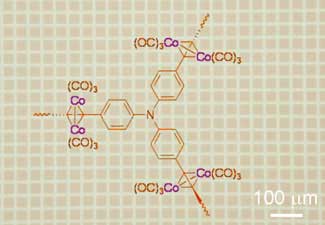| Posted: May 18, 2007 |
Tunable photonics with high refractive index |
|
(Nanowerk News) Scientists in Hong Kong have created a polymer with a refractive index that can be tuned as high as 1.81 ("Metallized hyperbranched polydiyne: a photonic material with a large refractive index tunability and a spin-coatable catalyst for facile fabrication of carbon nanotubes" – free access article).
|
|
The refractive index (RI) is a measure of how much the speed of light is reduced in a medium. Conventional organic glasses such as PMMA have a particularly low RI and also within a narrow wavelength range. Therefore although they are cheap to produce, flexible and easy to coat onto large surfaces, their optical properties are limited.
|
 |
| Organometallic cluster superimposed on the photonic material
|
|
Ben Zhong Tang's group from the Hong Kong University of Science and Technology have attached organometallic nanoclusters to the triple bond network of a hyperbranched polydiene. This had the effect of increasing the refractive index to 1.81, vastly improving its optical performance.
|
|
In addition, they discovered that under UV irradiation the organometallic moiety broke away from the polymer complex. This caused the RI to drop by as much as 0.05 in the 1500-1600 nm region, producing a visible photochromic response.
|
|
"They discovered that under UV irradiation the organometallic moiety broke away from the polymer complex."
'Such an unusually high RI change makes our polymer an interesting material for waveguide, memory and holographic storage applications,' said Tang.
|
|
In the future, the group hope to induce the change in the RI of this polymer in a reversible manner. They believe that this could lead to write and read as well as erase and rewrite optical memories. 'Such photonic materials could dramatically enhance the data processing speed and optical holographic data storage applications with much higher accessible capacity,' said Tang.
|

